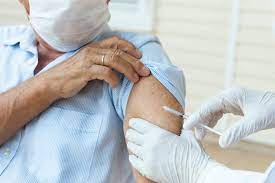Cancer Vaccine: A New Hope in the Fight Against Cancer
- Aug 5, 2022
- 4 min read
A cancer vaccine, or immunotherapy, uses the body’s immune system to fight cancer cells and slow down or prevent further spread of the disease. In some cases, the vaccine can lead to total remission of cancer without any harmful side effects. To learn more about what makes this option different from chemotherapy and radiation treatment, click here.
What is it?
The cancer vaccine is a treatment that uses the body’s immune system to fight cancer. It is made from viruses, bacteria, or other substances that stimulate the immune system. The cancer vaccine is also called immunotherapy or biologic therapy. It often works by making the person's immune system recognize and attack cancer cells as foreign invaders.
There are two main types of vaccines used in this type of treatment: active and passive. Active vaccines use materials such as proteins, sugars, and molecules to activate an immune response against tumors. Passive vaccines contain antibodies for use in fighting tumor cells in people who have already been diagnosed with cancer. These therapies can be given through injections or intravenously. Some common vaccines include cytotoxic T-cells, monoclonal antibodies, cytokines, and growth factors.
Most treatments target specific types of cancers by attacking them directly; however some treatments help the body to better respond to developing cancers. These therapies may be given before someone develops cancer or after they've been diagnosed with cancer in order to protect them from getting another kind of cancer later on. The goal is to reduce the risk that a person will get a different type of cancer. For example, people who have received chemotherapy are less likely to develop lymphoma as well as other kinds of cancers.
Who’s Developing it?
The cancer vaccine is being developed by a team of researchers at the University of Pennsylvania. The team is led by Dr. Carl H. June, who has been working on the project for over 10 years. In March 2017, they announced that they had successfully tested the treatment in 17 people with chronic lymphocytic leukemia (CLL). All but one of these patients experienced complete remission. They have now entered Phase I/II clinical trials, which are the first large-scale tests of efficacy and safety. Patients will be given varying doses to test how their immune systems react. Dr. June and his team hope that this vaccine can eventually be used as a cure for CLL and other types of cancers. With any luck, it could even be applied to help treat some forms of HIV and herpes. If it does become widely available, it would take decades before we see results. However, many scientists believe this development could lead to an improvement in cancer care for generations to come. This could make immunotherapy much more personal than it currently is, said Dr. Anthony Marucci from the Memorial Sloan Kettering Cancer Center in New York City. If you get exposed to cancer cells and your body mounts an immune response, you’re protected from future exposures because you already have immunity through vaccination.

What do we know so far?
The cancer vaccine is a new and promising treatment for cancer. So far, it has shown great promise in early clinical trials. The cancer vaccine works by targeting specific proteins that are found on the surface of cancer cells. This helps the immune system to recognize and destroy cancer cells. The cancer vaccine is still in early development, but it has the potential to be a powerful tool in the fight against cancer.
Recent research suggests that combining a cancer vaccine with conventional treatment can help to improve its effectiveness. When it comes to safety, there haven’t been any serious side effects observed so far. The cancer vaccine appears to be safe, but it will still need to go through more clinical trials before we know for sure. It is not yet approved by national health authorities and is currently only available at a handful of trial centers in countries such as Japan and China. Clinical trials have been limited because pharmaceutical companies are hesitant to invest in unproven therapies like the cancer vaccine. One concern is whether or not a patient's own immune system would attack healthy tissue when fighting off tumor cells carrying these target proteins, resulting in inflammation or swelling. There may also be risks associated with suppressing an overactive immune response against cancer during other treatments (such as chemotherapy). However, if this novel approach proves successful during future clinical trials, it could become an important part of our arsenal in treating all types of cancers.
How much will it cost?
Some cancer vaccines are currently being tested on and, if they're proven to be effective, might be available within a few years. One problem with cancer is that there are many types of it, and so cancer vaccines are often tailored specifically for each type. Another problem is that testing costs millions of dollars. Since cancer vaccines have never been used before, it's difficult to know how much they will cost, but researchers think they will be less expensive than chemotherapy or radiation treatments since these other treatments usually attack all cells at once while a vaccine only targets specific cells or growth factors.
When will it be available?
The cancer vaccine is a new hope in the fight against cancer. It is said to be able to prevent cancer cells from growing and spreading, and may even be able to kill existing cancer cells. The cancer vaccine is still in development, but it is hoped that it will be available within the next few years. Early clinical trials have shown promising results, and the vaccine is currently being tested on humans. If all goes well, the cancer vaccine could be available to the general public within a few years



Comments